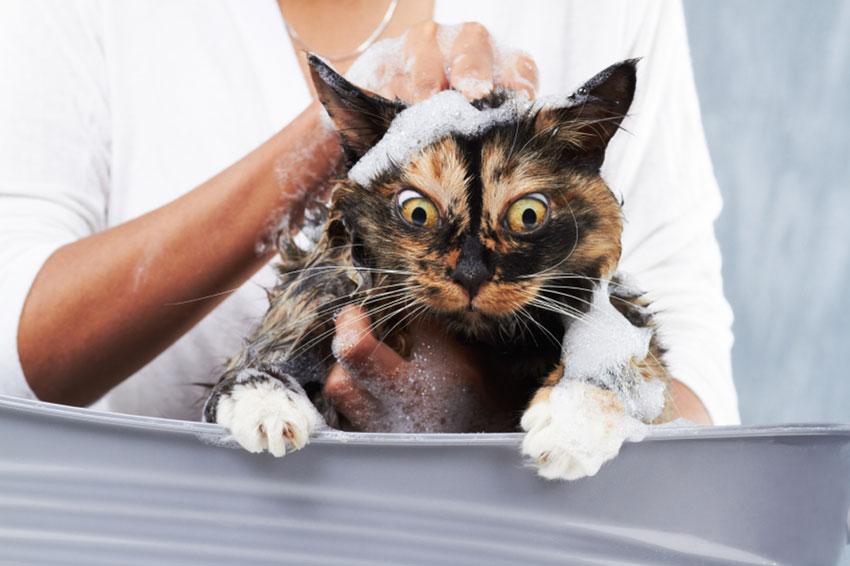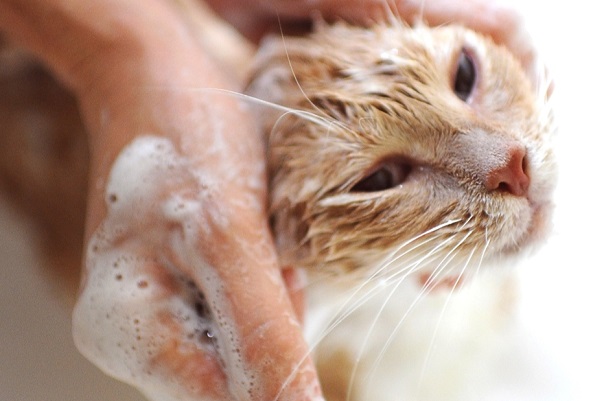I know how giving your cat a bath can be the stuff of nightmares. The constant clawing, meowing, trying to slip out of your hands, showering you in water… Every cat parent dreads of this stuff. And even though cats are pretty clean animals (they do self-groom themselves), bathing them becomes essential because they have a knack for getting themselves dirty time and again. So what if we can share with you a method on bathing a cat which would be very useful for first timers who are too afraid of their cat’s first bath?
How to Bathe a Cat
1. Get the right equipment
Yes, there are certain things you have to keep aside in advance, so as to not panic when you are bathing your cat. I mean, no point in running to buy items during the bath, right? Keep the following items by your side:
- Clean towels, at least 2;
- Brush of a comb, depending on the fur of your cat;
- A shampoo or soap for cats. Make sure it lathers well;
- An anti-slip mat, a rubber one would do just fine, on which you can place your cat to towel dry her.
If possible, have one more person by your side to help you in case your cat decides to struggle during the bath. One person may not be enough to keep your cat in check, especially when everything is wet and getting a hold of it, literally, can become very difficult.
2. Get a hold of your cat
Cats can sense when you want to do something to them that they won’t like. For a cat that’s never had a bath before, catching it is a tough task. And when you do so, no matter how much she struggles or claws, don’t let go. Rush to your bathroom, close the door instantly and Then put her down. Shutting the door is important because as soon as your cat sees it’s in a room of the house it doesn’t want to be in, it will want to bolt.
3. Have patience
Patience is key. It’s very easy to panic, get irritated, frustrated or even angry at your cat when giving it a bath. But none of these emotions will help you crack the question of how to bathe a cat successfully. So let go of them. Cats can sense stress, so the more stressed you are, the more stressed it will become. Plus, your cat has already panicked, so shouting at it is only going to make the situation worse.
4. Run her a bath
With your cat on the floor, open the taps of your sink and make sure there’s warm water running. The water should neither be too hot or too cold – both are bad for your cat. Fill the sink with an appropriate amount of water, get a hold of your cat and then place her in the sink firmly.
5. It's shampoo time
When your cat’s fur is wet, lather it up with some shampoo. Make sure you don’t get it anywhere near her eyes or ears. Rub it in gently and get to even the toughest parts of her body.
6. Rinse and repeat
Now that it’s all shampooed up, it’s time to get rid of that shampoo. Be sure you wash it thoroughly; no amount of shampoo should be left behind on its body. That can lead to skin irritation, dry or red patches and even infection, causing you cat to constantly scratch that area. Not to mention that it may even lick that area of the skin, meaning it would be ingesting the soap, leading to stomach problems. Do remember to rinse its entire body at least twice thoroughly, a vital tip on how to bathe a cat.
7. Wash its face
It’s best to avoid soap or shampoo on its face entirely. Just take a washcloth, dip it in warm water and wipe your cat’s face with it. Do it a couple of times, and your cat’s good to go.
8. Towel dry your cat
Take your cat out of the sink and place it on the rubber mat. Dry it with towels and if one towel becomes entirely soaked, take out the second towel and pat it dry. The other option is to wrap your cat in a towel and take it to a warm room where it can dry by itself. You can also use a blow dryer, but know that the sound may alarm your cat too much for you to be able to dry it that way.
9. Brush your cat
Once you cat is dried or almost dry, take out the brush or comb and comb its fur. For the first couple of times, do it against the growth of her fur so that the hair that’ll shed soon enough can be caught by your brush. After that, brush her fur in its direction of growth. Do this for a couple of times to get rid of any hair that she might possibly shed.
10. Do it sooner
Always remember that when it comes to how to bathe a cat, the earlier you introduce your cat to baths, the more cooperative she will become with future baths. So if you have a kitten at home and are waiting for her to grow up so that she might be “old” enough to take a bath, it may not be the best approach.
